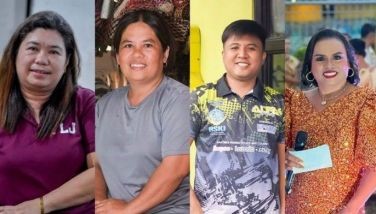Trapos blocking absentee voting bill — Solon
January 19, 2002 | 12:00am
The principal sponsor of a bill seeking voting rights for overseas Filipinos accused traditional politicians or trapos among his colleagues yesterday of blocking the measure.
Iloilo Rep. Augusto Syjuco told a news conference that trapos in the House are afraid of the proposed law "because it will change the character of the Filipino vote and quicken the pace of political maturity, thus signaling the end of their kind."
He said Filipinos abroad are generally more discerning and more disciplined since they are exposed to more mature government systems.
"This bloc of prospective voters will not as easily succumb to gimmickry, vote-buying or threats, and constitutes an emerging social force that will dilute, if not eliminate, dagdag-bawas or large-scale cheating altogether," he said.
Thus, trapos have been successfully blocking the approval of the so-called absentee voting bill since 1987, when the post-martial law Congress convened and when the measure was first introduced, he stressed.
Syjuco chairs the committee on suffrage and electoral reforms. He has refused to sponsor the absentee voting measure apparently in frustration over what he called an interminable delay in the passage of the bill.
Negros Occidental Rep. Jose Apolinario Lozada has taken the job of sponsoring the proposal. Lozada chairs the foreign relations committee.
Syjuco said trapos have been joined by "closet queens" in derailing the measure.
"These closet queens do not dare speak out against our absentee voting bill because it is popular. As cross-dressers, they pretend to be in favor of its approval but resort to underhanded or closet tactics to hamper its progress in Congress," he said without naming names.
He said the opponents of the measure have been making "absurd" proposals that would render voting rights for overseas Filipinos "ineffective or virtually useless."
Among such proposals are postponing such voting rights to 2007 and disqualifying those who have acquired immigrant status.
Critics of the bill fear that if such rights were given, the votes of millions of overseas Filipinos could be faked or manipulated, and the tabulation in Philippine embassies rigged.
Iloilo Rep. Augusto Syjuco told a news conference that trapos in the House are afraid of the proposed law "because it will change the character of the Filipino vote and quicken the pace of political maturity, thus signaling the end of their kind."
He said Filipinos abroad are generally more discerning and more disciplined since they are exposed to more mature government systems.
"This bloc of prospective voters will not as easily succumb to gimmickry, vote-buying or threats, and constitutes an emerging social force that will dilute, if not eliminate, dagdag-bawas or large-scale cheating altogether," he said.
Thus, trapos have been successfully blocking the approval of the so-called absentee voting bill since 1987, when the post-martial law Congress convened and when the measure was first introduced, he stressed.
Syjuco chairs the committee on suffrage and electoral reforms. He has refused to sponsor the absentee voting measure apparently in frustration over what he called an interminable delay in the passage of the bill.
Negros Occidental Rep. Jose Apolinario Lozada has taken the job of sponsoring the proposal. Lozada chairs the foreign relations committee.
Syjuco said trapos have been joined by "closet queens" in derailing the measure.
"These closet queens do not dare speak out against our absentee voting bill because it is popular. As cross-dressers, they pretend to be in favor of its approval but resort to underhanded or closet tactics to hamper its progress in Congress," he said without naming names.
He said the opponents of the measure have been making "absurd" proposals that would render voting rights for overseas Filipinos "ineffective or virtually useless."
Among such proposals are postponing such voting rights to 2007 and disqualifying those who have acquired immigrant status.
Critics of the bill fear that if such rights were given, the votes of millions of overseas Filipinos could be faked or manipulated, and the tabulation in Philippine embassies rigged.
BrandSpace Articles
<
>
- Latest
- Trending
Trending
Latest
Trending
Latest
Recommended





























